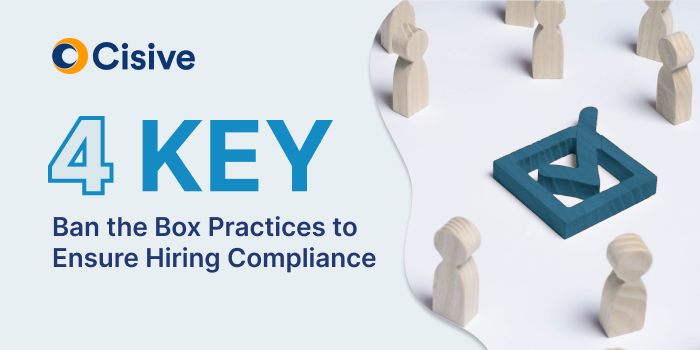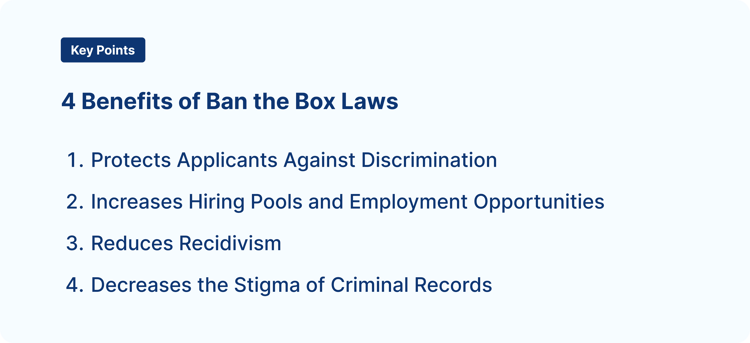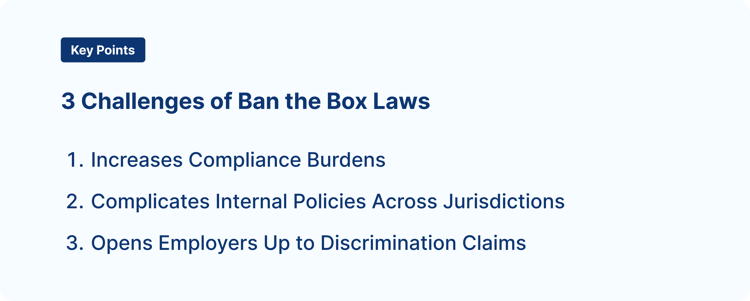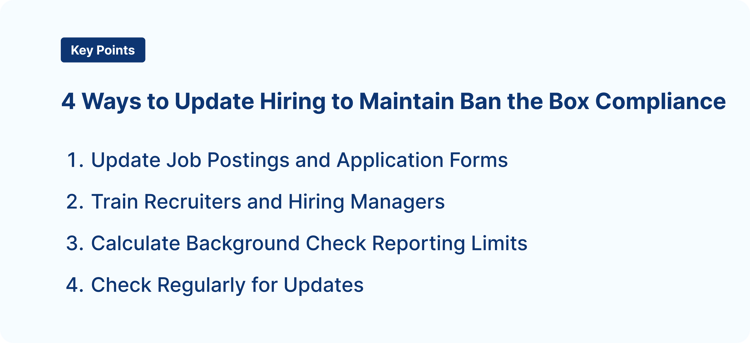

A safe work environment isn’t just about maintaining physical and digital safety. It also requires...

“Ban the box” laws have existed for more than 20 years and have taken effect across dozens of states and at the federal level. The premise of ban the box legislation is simple: Expand employment access to people with past criminal histories, offering a fair chance at employment opportunities.
As ban the box laws continue to spread, employers need to understand the effect on their hiring process — and the consequences of discriminating against applicants with criminal histories.
Learn more about what ban the box is, the benefits and challenges of these laws, and how employers can ensure a fair and equitable hiring process.
|
“Ban the box” refers to laws that prohibit or restrict employers from asking about a job applicant’s criminal history on job applications, especially early in the hiring process. The first such state law was passed more than 20 years ago in Hawaii. The “box” refers to a check box that used to be common on job applications. The box required candidates to immediately reveal whether they had a criminal past.
The goal of the ban the box legislation is to ensure that applicants who have been convicted for minor offenses can be evaluated based on their qualifications, more so, than their past actions.
Ban the box laws don’t necessarily prohibit employers from asking about a job applicant’s criminal history. They often make employers wait until late in the hiring process and require that the candidate receive a chance to explain the results of a background check. Ban the box laws are intended to reduce recidivism and help people employment, even when they may have past criminal infractions.
The details of these laws can vary by jurisdiction, including for companies that are required to reconcile state law and rules for federal contractors.
In the past 25 years, dozens of states and more than 100 local governments have passed ban the box legislation. Additionally, the federal government has taken action within agencies and with regard to federal contractors.
Public and private employers operating across multiple jurisdictions will need to understand how local, state, and federal contracting laws affect their operations. Even if you operate in certain states without ban the box laws, you might enact a higher standard across your operations for consistency and to avoid potential errors.
Over 150 cities and counties have enacted ban the box laws, including New York City, Chicago, Philadelphia, San Francisco, and Los Angeles. Generally speaking, city and county ordinances prohibit locally operating employers from inquiring about a candidate’s criminal record early in the hiring process.
Some local laws have additional conditions. Chicago’s amended law, for example, requires notice both before an adverse action is taken and when a final adverse action occurs.
Most U.S. states have ban the box laws, with Louisiana and Maine joining the list in 2021. However, many of these state laws only apply to public sector employees.
Many states with ban the box laws require that employers wait until after an initial interview or a conditional job offer before asking questions about criminal history. In states such as California, employers must notify applicants if they’re denied employment because of their criminal record and give them a chance to respond.
Even when a criminal background check is allowed, most states bar consideration of certain records, such as expunged convictions or cases where no conviction was obtained.
Since 2016, federal agencies have been subject to ban the box regulations. That was extended to federal contractors under The Fair Chance Act of 2019, which prohibits contractors from running criminal checks before making a conditional offer of employment.
The Equal Employment Opportunity Commission (EEOC) recently issued reports looking at the effect of ban the box policies in the federal workforce. The reports found that workers with criminal records are much less likely to become federal workers, in part because they may not apply in the first place or withdraw their application before the hiring process is complete.
The EEOC hopes to educate the public, and especially job applicants with criminal backgrounds, about fair public sector employment opportunities.
Ban the box laws promote fairer hiring practices and give candidates a better chance to demonstrate their fitness for the job, regardless of their personal background. Here are a few ways ban the box laws can help employers and employees.
By removing the box on job applications, employers remove one source of subjective assumptions about a potential employee’s character. This levels the playing field for people with a criminal record who have paid their debt to society but remain stigmatized in the job market.
Ban the box laws encourage employers to focus on an applicant’s qualifications and abilities. By removing the box on the application form, employers assess criteria such as a person's skills, experience, and potential rather than making a snap judgment based on criminal history.
Ban the box laws give employers access to a larger pool of potential candidates because candidates aren’t automatically disqualified, opening more access to jobs.
Nearly 80 million Americans have a criminal record, according to federal data. Excluding them, automatically through filters or by discriminating against them, fails to distinguish between different types of criminal history and limits your talent pool.
When employers remain open to applicants with criminal backgrounds, they increase their chances of finding the right people for your workforce. One restaurant chain, for example, has built its recruitment strategy on its commitment to fair-chance hiring.
Recidivism refers to the tendency of people with criminal pasts to reoffend. One factor contributing to recidivism is the lack of employment opportunities. By creating more work options for these individuals, ban the box laws reduce the likelihood of re-offense, which is good for workers, employers, and society.
These laws also provide an incentive for employers to invest in criminal justice rehabilitation programs and other support services for individuals with criminal records. By providing access to employment opportunities, companies create pathways for individuals to reintegrate into society and succeed.
Ban the box laws encourage employers to see job applicants as people first, not as criminal offenders. Even when employers get to the hiring decision stage, where they often run criminal background checks, they can give finalists with criminal records more equal consideration and therefore a better opportunity to get hired.
The candidate might express extenuating circumstances with regard to their conviction, for example, or may explain how they’ve since improved their life. This gives context for employers to see the potential employee’s current state while reducing the stigma associated with having a criminal record in their past.

Like any law regulating employment, ban the box laws can complicate compliance within your HR processes. Here are three ways ban the box laws present challenges for employers.
Ban the box laws usually prohibit employers from asking about criminal history upfront. Employers must remove the criminal history question from job applications and wait to inquire about criminal history until later in the hiring process. This means employers must take additional steps to ensure compliance, including updating job applications and training your hiring team on when they can and can’t ask the question.
Many ban the box laws include additional rules and regulations. For example, in keeping with EEOC best practices, employers can’t discriminate against candidates who are arrested but not convicted.
Additionally, employers must create an objective process for determining when to disqualify an applicant based on criminal history. The EEOC allows employers to make decisions based on background screening results if the exclusion is “job related and consistent with business necessity.” Employers need to define what that means in terms of their industry and organization.
Certain sectors, such as healthcare, finance, and transportation, are highly regulated and have detailed background check rules, including for certain job roles and duties as outlined by the US Department of Justice.
Companies with employees in multiple jurisdictions, including within the same state, can be challenged to set consistent hiring policies. Some locales might allow inquiries about criminal background at any point of the hiring process, while other jurisdictions might restrict or ban this activity. Maintaining compliance can be difficult and time-consuming for employers dealing with a patchwork of laws.
When recruiters, HR, and hiring managers are faced with conflicting regulations, being consistent and avoiding costly mistakes is more difficult. One potential solution is to adopt a companywide policy reflecting the strictest legal conditions. For example, if you operate in one state with a ban the box law and two states without them, you would apply the ban the box law to all hiring activities, regardless of geography.
Employers who openly violate ban the box laws can be found liable for discrimination claims. If a recruiter improperly discards a candidate’s application based on an arrest that didn’t result in a conviction, for example, the candidate could sue for discrimination.
In practice, ban the box laws can sometimes produce unexpected or discriminatory results. Research cited by the Urban Institute found that employers were less likely to call back Black and Latino applicants following passage of ban the box laws. Employers must watch for any subjective assumptions being made by recruiters or hiring managers, even when criminal background checks are restricted.

Ban the box laws affect every stage of the hiring process, including the questions asked on job applications, during interviews, and as part of background checks.
In most cases, employers can consider criminal history when making hiring decisions. But even then, ban the box laws still help candidates with a criminal history achieve greater access to employment. They can allow the candidate to move farther down the hiring funnel and provide an opportunity to give an explanation of their circumstances rather than being disqualified early on — potentially by an automated filter.
Here are ways employers should adjust their practices under ban the box laws.
Start by updating job descriptions and application forms to remove potentially illegal language or questions about criminal history.
Additionally, include language in your job postings stating that your organization complies with ban the box laws and when, if at all, you’ll consider criminal history.
Under most ban the box laws, recruiters can’t use criminal background information to whittle down the candidate pool. Make sure they understand when, if at all, they can ask about a job applicant’s criminal history during the early stages of hiring.
HR leaders also need to train hiring managers on how ban the box laws apply to their role in the hiring process. Managers must understand what’s legal and what’s not when interviewing candidates or making final hiring decisions.
While ban the box laws typically permit the use of criminal background screenings when making hiring decisions, there are limits to what information you can access. In keeping with the spirit of ban the box laws and the Fair Credit Reporting Act, employers can only review background information related to certain offenses going back seven years. This often applies to criminal record searches.
Develop a policy regarding reporting periods for background check results. Work with legal counsel to address exceptions or job roles that require more stringent reporting, and review the EEOC policies and guidance on using criminal information in employment decisions known as the “Green Factors.”
Ban the box is an area of law that’s still evolving, with states and local jurisdictions continuing to adopt ban the box or modify existing law. Make sure you regularly check your organization’s legal obligations, especially if your organization is expanding its geographical footprint.
In-house legal counsel can help you ensure that hiring policies and processes are in compliance. A trusted background screening partner can help, too. Good background check vendors track legislation that could affect background screening processes and proactively adjust products and services to ensure compliance.

A job candidate’s past doesn’t have to dictate their future. With the increasing popularity of ban the box laws, employers need to focus on hiring practices that look beyond a person’s criminal record and instead emphasize their strengths, skills, and abilities. Develop a diverse and talented workforce by investing in effective recruitment processes that focus on a candidate’s qualifications and potential.
As you figure out how ban the box regulations affect your business, enlist a qualified partner. Cisive’s comprehensive ban the box compliance solutions help you proactively maintain compliance so you can confidently make sound and compliant hiring decisions. Speak to an expert today!Author: Michael Kendrick
Bio: Senior Manager of Corporate Compliance at Cisive.
Let's Connect on LinkedIn
A safe work environment isn’t just about maintaining physical and digital safety. It also requires...

The hiring process can be time-consuming and expensive, so companies want to ensure their...

Automatically disqualifying candidates with a criminal record can unfairly impact a qualified...